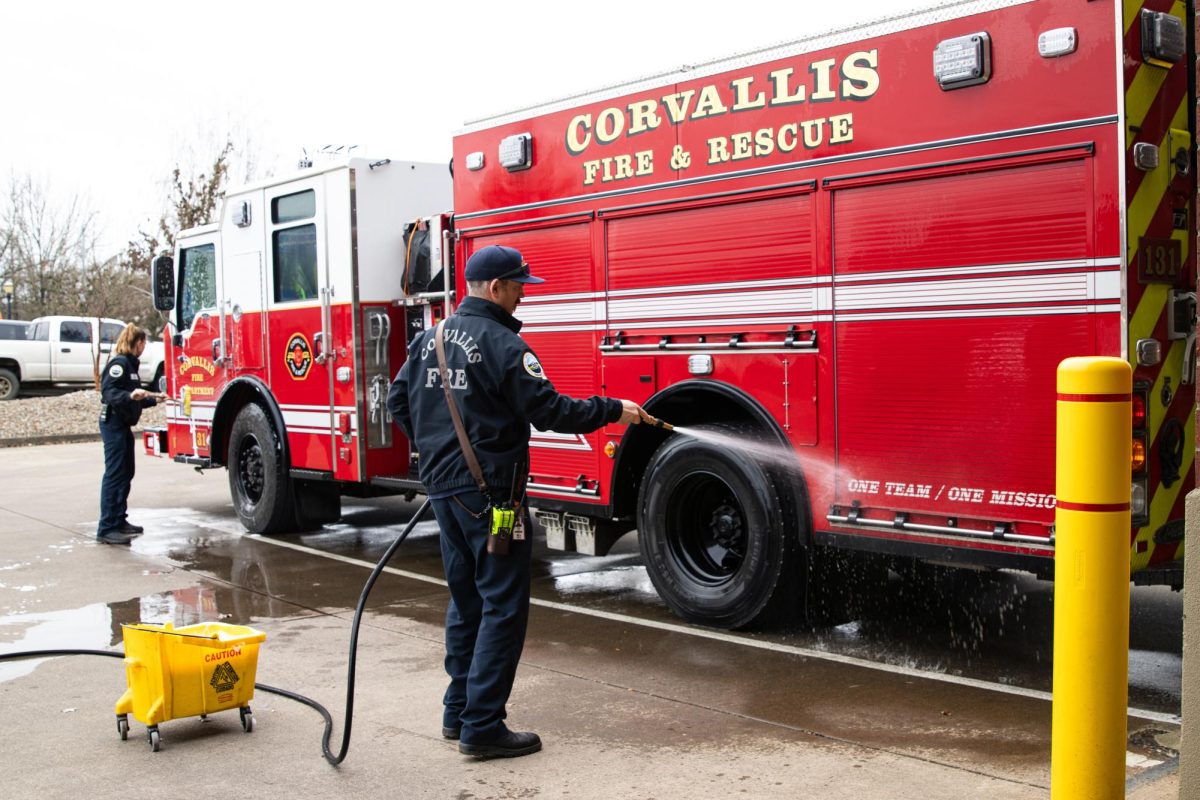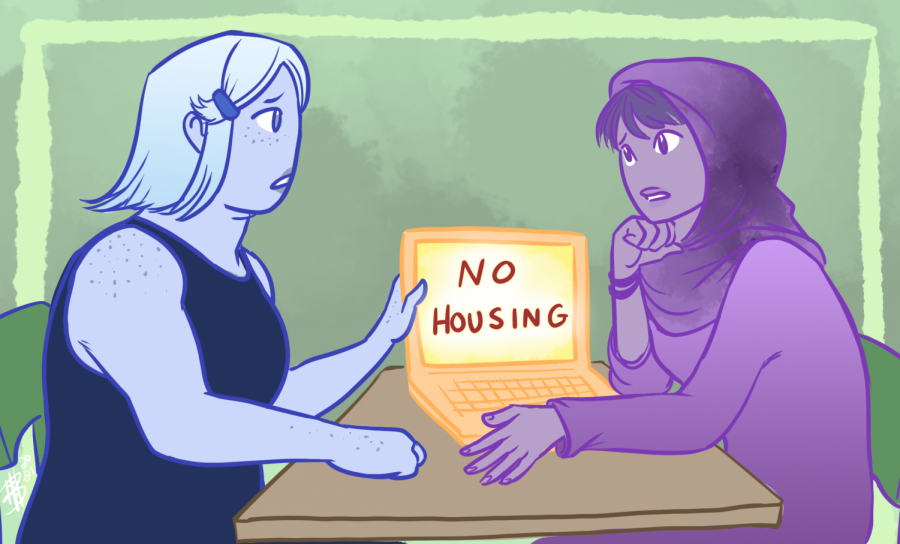Clairmont: Lack of co-op housing options disproportionately affects OSU’s female students
This illustration shows two students worrying over available housing. Currently, new policies and a lack of funding ultimately caused the dissipation of Oregon State University’s on-campus co-ops, making it so finding off-campus communal housing remains an obstacle for female students.
September 7, 2021
Editor’s Note: This column does not represent the opinion of The Daily Barometer. This column reflects the personal opinions of the writer.
While new policies and a lack of funding ultimately caused the dissipation of Oregon State University’s on-campus co-ops, finding off-campus communal housing remains an obstacle for female students.
Male students looking for off-campus cooperative housing have the option of staying at the Christian-affiliated Varsity House, the Haven and the non-religiously-affiliated Beaver Lodge, but similarly situated women enrolled at OSU don’t have the option of joining a non-religiously affiliated co-op in Corvallis.
The House of Charis and the Chi Alpha community house are two Christian discipleships available to OSU’s female students looking for a cooperative housing option. These houses remain the only co-ops readily available to female students looking for an affordable co-op living environment.
The lack of female cooperative housing options disproportionately affects women attending OSU who do not identify as Christian. The university couldn’t predict these unforeseen costs following the shutdown of sponsored co-op housing on campus, but it is hard to ignore the reality that female students are now disadvantaged by the lack of opportunity following these policies.
Those involved in these colorful thriving communities, including Justin Ford, a senior studying biology and the vice president of the all-male Beaver Lodge co-op, praises the many benefits this style of living has to offer.
“Most people, when they come to college, are looking for this type of experience to be exposed to a lot of different people and have a lot of different opportunities to socialize,” Ford said. “One of the main benefits is you have this built-in circle of people that learn to work together and a lot of opportunities to organize projects.” Ford adds that living at the Beaver Lodge gives students flexibility to juggle their responsibilities, saying, “Anybody who has tried to cook food, work a job and live on their own while going to school could tell you it is really, really difficult… For people who are just getting out on their own and trying to focus on their studies while also having a good college experience, this is a really good place [to live].”
Many college students continue to look for ways they can save time and money. Living in a co-op is one of the cheapest ways to attend OSU. Food, utilities, water and garbage is included in the monthly payments. Not to mention the proximity of the buildings to campus drastically cuts transportation costs.
For women looking to live in a similar cooperative housing space, Christian discipleships, such as the House of Charis and the Holly House, are two wonderful places to live for those who identify as Christian.
“It is a really good environment for making good friends and having a strong community,” said Christian Anderson, the director of Chi Alpha, which is part of the Holly House. “If you’re somebody that is excited to hang out with other people and you’re excited to have a community, then it is really positive.”
Anderson adds, “It is a directional house, so if somebody is just looking for a place to live, it is not the best environment… In the past, [those] who were not Christian found it didn’t quite fit.”
Regardless of the lack of cooperative housing options for women, Anderson found the demand for it to be high.
“We put it on Craigslist, and it was full in about a week and a half… So, in terms of need and interest, it seems that a lot of girls on campus would be very interested and have a strong desire in co-op situations,” Anderson said.
Investing in a female co-op building open to all of OSU’s female students would close the existing opportunity gap.
Anderson agrees, saying, “I think there is a strong need. Even in the Christian world, I think there are only two women co-ops, ours and the House of Charis, [which] is way bigger than ours… My impression is that there is a lot more space for women’s housing.”
Demand for female cooperative housing is strong, but Steve Clark, the vice president of University Relations and Marketing, argues that shutting down the university-sponsored student cooperatives in 2014 was warranted.
“There were four student co-op living programs and facilities that, following a comprehensive review by the university and University Housing and Dining Services, concluded that we would not be able to support continuing the cooperative living and program after June of 2014,” Clark said. “The comprehensive evaluation sought to do several things; one was to assure that any housing provided by the university was in alignment with the university’s values.”
While this might be the best choice in terms of supervision of students and efficient living arrangements—especially for freshmen entering OSU—the monetary implications for those who might not qualify for financial aid from the university or other housing arrangements lost a chance at choosing a cheaper housing option through the university.
Still, Clark claims following the shutdown that the university aimed to provide cost and choice variables for all students as well as offering resources to those looking for cheaper off-campus housing options.
“We continue to evaluate how to serve student needs… Many students have desires to not live on campus or not live in university housing, so we provide information to our students about housing choices and information about how to work with landlords.”
The Human Services Resource Center and the Basic Needs Navigator are two of many programs on campus dedicated to helping students with housing and financial needs find housing, but because many don’t qualify for receiving these benefits, it is hard to say that the programs are enough of an equalizing force for students.
Oregon State has dedicated a great deal of time, money and resources into ensuring student success for those disadvantaged at OSU, but cooperative living environments are extremely helpful to students looking for structure and a dynamic community without breaking the bank.
Many female students at Oregon State would love to see a similar cooperative living option to the Holly House or the House of Charis for non-religious individuals.
There is no denying that co-ops are a great living-learning environment for students and seeing more of them open up on or off-campus could make a big impact in many students’ lives.
















































































![Newspaper clipping from February 25, 1970 in the Daily Barometer showing an article written by Bob Allen, past Barometer Editor. This article was written to spotlight both the student body’s lack of participation with student government at the time in conjunction with their class representatives response. [It’s important to note ASOSU was not structured identically to today’s standards, likely having a president on behalf of each class work together as one entity as opposed to one president representing all classes.]](https://dailybaro.orangemedianetwork.com/wp-content/uploads/2025/03/Screenshot-2025-03-12-1.00.42-PM-e1741811160853.png)
























